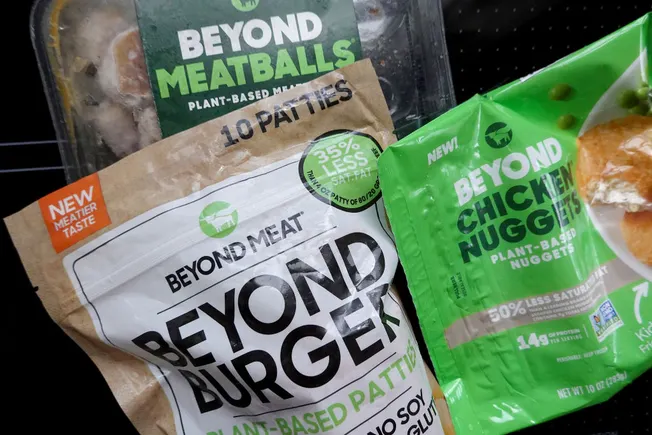Flavor house T. Hasegawa USA created natural savory flavors for alt-protein applications, leveraging unique technology and chemical processes, as the plant-based protein market struggles to find its footing.
T.Hasegawa’s Plantreact is a paste or liquid flavor that leverages fermentation processes and Maillard reactions, Mark Webster, VP of sales and marketing at T. Hasegawa USA, said. Maillard reactions are chemical processes involving amino acids and reducing sugars to produce mealnoidins – the chemical that provides browned foods their flavors.
The new flavor can be used in plant-based beef, chicken and pork applications, including vegan steaks, pizza toppings, crumbles and more, Webster added.
Additionally, T. Hasegawa can create dairy flavors in alt-milk products and creamers with Plantreact, Mary Maier, director of flavor creation at T. Hasegawa USA, said.
Plantreact was created in partnership with T. Hasegawa USA and its Japanese counterpart through its Bridge to Tokyo program, where the two halves of the company work together on innovative flavor solutions, Maier said.
These flavors join T. Hasegawa’s portfolio of ingredients for plant-based foods and beverage, including its fat-mimicking technology EmulsiTRACT. EmulsiTRACT emulsion technology recreates the creamy mouthfeel of whole milk or half and half by matching the plant protein size to that of animal proteins, Maier explained.
The taste, texture and price paradigm challenges persist
The release of the new flavors comes after several recent blows to the plant-based meat and dairy markets.
Last week, Beyond Meat’s business viability was called into question following another quarter of troubles for the plant-based meat pioneer, while mycelium poster child Meati prepares to sell its business following a technical default, as previously reported.
The US plant-based protein market was worth $1.225 billion in 2024, declining 9.6% year-over-year, according to Mintel data.
More than a third (36%) of consumers said that plant-based proteins did not taste great, according to a 2024 Mintel survey.
Plant-based proteins, like soy and pea, are bitter, requiring masking ingredients and added flavors, Maier explained.
“You can have something that is affordable, but if it does not taste good, then no one is going to buy it. If it tastes good but there is no texture, and it is way too expensive, nobody is going to buy it. You need all of these things moving at the same speed – that is where the headwind is,” Webster said.
Plant-based proteins “are just trying to get down to the price of animal proteins,” requiring food and beverage manufacturers to find new ways to formulate products, often with an eye to clean label trends, Webster noted.
Plant-based meats “tend to take a lot of flavor,” but food companies can use less flavors with Plantreact – which is also heat stable throughout the manufacturing process – Maier said.
Future Food-Tech Chicago kicks off on June 2
Looking for more insight into alt ingredients? Then, make sure to check out the session titled “Shaping Behaviors: Strengthening Consumer Acceptance & Understanding for Commercialization Success” at the Future Food-Tech event in Chicago, June 2-3.
The panel discussion will be moderated by Ashley Hartman, managing partner at Bluestein Ventures, and feature:
- Lou Cooperhouse, founder and CEO of Bluenalu
- Jaime Reeves, CTO of Mattson
- Auroni Majumdar, VP of R&D Global Open Innovation at CJ Cheiljedang
Visit the event website here to learn more and register today!



